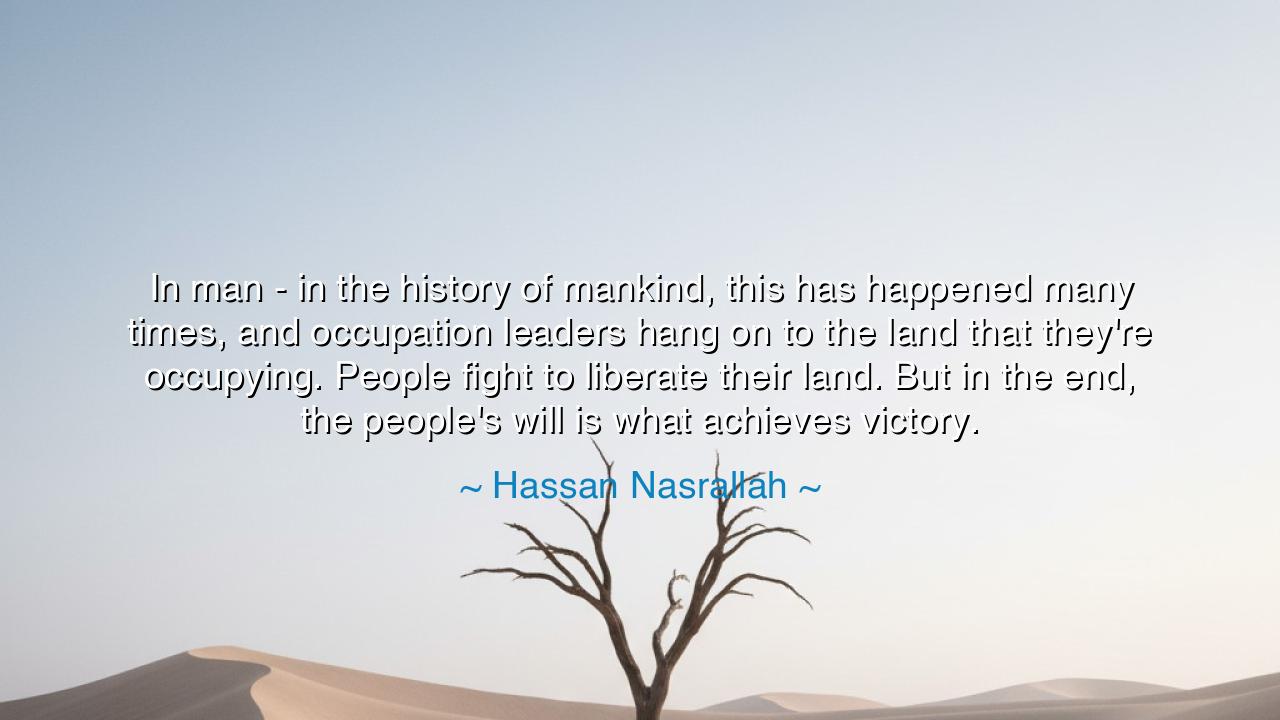
In man - in the history of mankind, this has happened many times
In man - in the history of mankind, this has happened many times, and occupation leaders hang on to the land that they're occupying. People fight to liberate their land. But in the end, the people's will is what achieves victory.






Hassan Nasrallah, a figure both controversial and unyielding, once proclaimed: “In man — in the history of mankind, this has happened many times, and occupation leaders hang on to the land that they're occupying. People fight to liberate their land. But in the end, the people's will is what achieves victory.” These words, born from the soil of conflict and the cry for sovereignty, echo through the ages like a timeless law of history. For in them lies the truth that no sword, no empire, no occupying power can forever suppress the will of a people determined to be free. Weapons may conquer bodies, but they cannot enslave souls that have tasted the memory of freedom.
The meaning of this quote is both political and profoundly human. Nasrallah speaks not merely of armies and occupations, but of the eternal struggle between dominion and dignity, between those who rule by force and those who resist through faith. Throughout history, conquerors have arisen, claiming divine right or destiny to possess the lands of others. Yet always, the story ends the same: their banners fade, their empires crumble, and the oppressed rise again. Why? Because will — the spiritual fire of a people — outlasts steel. The might of nations may occupy land, but not the hearts of those who belong to it. The land remembers its true children, and one day, it calls them home.
The origin of Nasrallah’s words emerges from the crucible of the Middle East — a land both ancient and scarred, where the struggle for self-determination has shaped generations. As leader of Hezbollah, he spoke to a people who had seen invasion, occupation, and the long shadow of foreign power. But his statement transcends borders. It speaks to the universal rhythm of history — the cycle in which every oppressor believes their reign eternal, and every oppressed people, through courage and endurance, proves them wrong. His declaration is not just for Lebanon, nor Palestine, nor any single nation; it is the voice of human resistance, the same voice that has risen again and again since the dawn of civilization.
Consider the story of Vietnam, a small nation that stood against the colossal power of empires — first France, then the United States. For decades, its jungles burned, its rivers ran red, and its cities were shattered. Yet, through all this, the will of the people never broke. Farmers became soldiers, teachers became strategists, and entire villages moved underground to keep the flame of freedom alive. The invaders believed their technology would guarantee victory, but history proved otherwise. In the end, the occupiers withdrew — not because they were destroyed militarily, but because they were defeated morally, worn down by a people whose resolve was greater than any bomb or bullet. Thus, the prophecy of Nasrallah’s words was fulfilled once more: “In the end, the people's will is what achieves victory.”
Or look back to the ancient Hebrews, enslaved in Egypt. For centuries, they toiled beneath the sun, their backs broken, their spirits tested. Yet within them burned the memory of a promise — that they were meant for freedom. No whip could extinguish that memory. When Moses arose, it was not as a magician or warrior, but as the embodiment of collective faith — the will of a people who refused to die as slaves. Pharaoh’s empire crumbled into dust, as all empires must, and the exiles crossed into their destiny. This is the same truth Nasrallah invokes: no occupation can outlast the endurance of a people who remember who they are.
Nasrallah’s quote also speaks to the spiritual anatomy of liberation. For victory does not come merely through arms, but through endurance, unity, and belief in the righteousness of one’s cause. The oppressor fights for power; the oppressed fight for life. That difference makes all the difference. A man fighting for greed grows weary when the prize is uncertain. But a man fighting for his homeland, his faith, his children — he cannot be conquered, because his soul is not bound to the earth alone. History belongs not to the mighty, but to the steadfast.
The lesson is eternal: true power lies in the will of the people. When that will is awakened, no tyranny can stand against it. The world has always underestimated the quiet endurance of the human spirit. It forgets that nations are not built on thrones or guns, but on the unyielding hearts of ordinary men and women who refuse to surrender what is sacred. Whether in lands under occupation, in systems of injustice, or in the private battles of the soul, the same law prevails: freedom is never granted — it is reclaimed.
So remember this, my children of tomorrow: when you face forces greater than yourself, when darkness seems endless, remember the countless generations before you who rose from the ashes of despair and reclaimed the light. The conqueror’s empire is but a storm — fierce, loud, and fleeting. But the will of the people is the mountain that endures, unmoved by wind or time. As Nasrallah reminds us, history bends always, inevitably, toward liberation — because the heart of humanity was never made to kneel.






AAdministratorAdministrator
Welcome, honored guests. Please leave a comment, we will respond soon